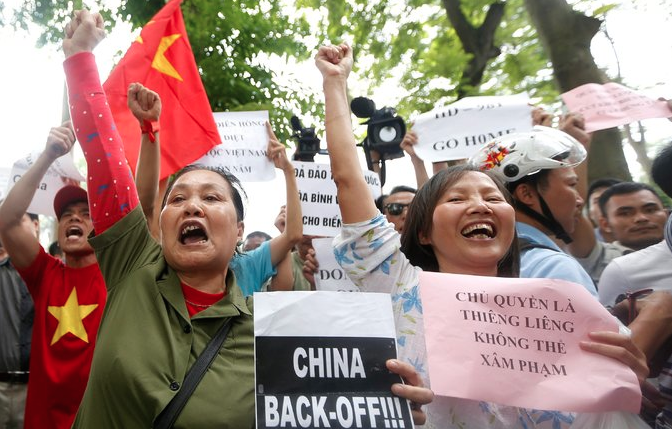(Photo Credit: Luong Thai Linh/European Pressphoto Agency)
(BGF) – The New York Times, covering China’s decision to place an offshore oil rig in the South China Sea, discussed Vietnams reaction to China’s oil rig. Vietnam asserted that China’s actions are “extremely dangerous” and threaten “peace, stability, security, and marine safety”. However, Vietnam failed to garner much support from its neighbors in its explicit condemnation of China’s assertive actions in the South China Sea. China is a major trade partner to Vietnam, as well as many of the other countries in the region, which led to only indirect, subtle critiques of China’s actions. Click here to read the full article or visit The New York Times‘ website.
Vietnam Fails to Rally Partners in China Dispute
By Mike Ives and Thomas Fuller
HANOI, Vietnam — Vietnam’s prime minister, Nguyen Tan Dung, accused China on Sunday of “dangerous and serious violations” in a territorial dispute that has raised anger toward China here to the highest levels in years.
Mr. Dung’s comments, which were carried in the Vietnamese state news media, were addressed to leaders of Southeast Asian countries attending a summit meeting in Myanmar. It was his strongest statement since China towed a huge oil rig into disputed waters off the coast of Vietnam this month.
“This extremely dangerous action has been directly endangering peace, stability, security, and marine safety,” Mr. Dung was quoted as saying, adding that Vietnam had acted with “utmost restraint.”
Mr. Dung’s comments were uncharacteristically spirited for the typically anodyne meetings of the 10-country Association of Southeast Asian Nations, but they failed to produce collective criticism of China. The leaders, who work by consensus, did not mention the dispute in their final statement on Sunday. Myanmar then released a statement after the meeting was over that expressed “serious concerns over the ongoing developments in the South China Sea,” but did not mention China. It called for self-restraint and the resolution of disputes by peaceful means.
The group’s refusal to weigh in appeared to be a victory for China and underlines how there does not yet appear to be a willingness or ability to address the territorial disputes in the South China Sea collectively. At least five nations claim islands in the sea, a major shipping lane and potential flash point as China becomes more assertive and hungry for resources.
Murray Hiebert, an expert on Southeast Asia at the Center for Strategic and International Studies in Washington, said Vietnam and the Philippines, another vocal critic of Chinese maritime claims in the South China Sea, “clearly wanted something a lot stronger” out of the meeting.
The Association of Southeast Asian Nations, or Asean, has been unable in recent years to reach a common position on the South China Sea even as China’s claims have reached more than 1,000 miles southward from the Chinese mainland. A summit meeting in Cambodia two years ago failed to produce a final statement because leaders quarreled over the issue.
China is the region’s largest trade partner, and countries like Cambodia and Laos are large recipients of its aid.
“Within Asean, you have countries that really don’t want to rock the boat,” Mr. Hiebert said. “They are playing it pretty much down the middle.”
Foreign ministers at the meeting in Myanmar issued an oblique statement on Saturday citing “serious concerns over the ongoing developments in the South China Sea,” but did not mention China by name.
Several hundred protesters demonstrated peacefully outside the Chinese Embassy in Hanoi on Sunday, and Vietnam’s authoritarian government took the rare step of permitting journalists from the state-controlled news media to cover the protest. Signs displayed slogans like “Denounce the Chinese Invasion.”
“We don’t have a problem with Chinese people or their culture, but we resent their government conspiring against us,” Nguyen Xuan Pham, a literary critic, said as the protest swelled in a public park across from the embassy and a military museum.
China towed the oil rig earlier this month to waters near the Paracel Islands, which China controls and Vietnam claims.
China’s state-controlled Xinhua news agency said Sunday that the oil rig was “completely within” China’s territorial waters. The rig is 140 miles off the coast of Vietnam, and about 17 miles from a small island claimed by both countries.
The maritime standoff with China, which has controlled the islands since 1974, has been widely discussed both in Vietnam’s state-controlled news media and on Facebook, which is very popular among the country’s urban middle class.
China is one of Vietnam’s major trading partners, and both countries have nominally socialist one-party governments. But Vietnamese officials sometimes appeal to anti-China sentiments here that are never far from the surface and rooted in a history of conflict between the countries.
Click here to continue reading.
